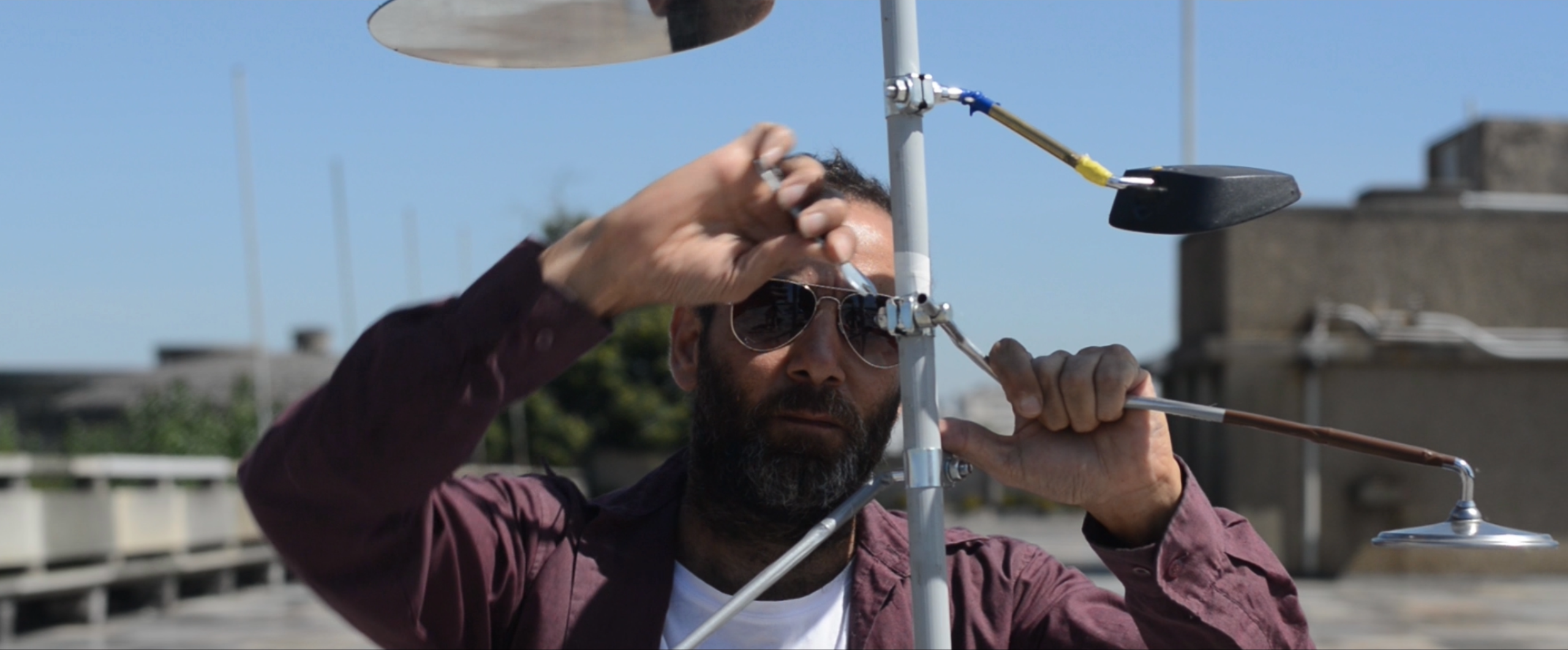In his multidisciplinary practice, Hiwa K explores a wide range of issues, from conflict and the memory of war, particularly in Southwest Asia (or the “Middle East”), to participatory politics and activism. He has also created works that reflect on the vicissitudes of displacement, informed by his own experience fleeing his homeland to escape armed conflict and state persecution. This conversation revolves around the question of finding home—or the possibility of belonging—while in exile, when global turmoil continues to cause unprecedented mass migrations across borders, especially from Asia and Africa, which has led to record numbers of refugees and asylum seekers today. K and Alsaden discuss some of the artist’s key works and ideas about displacement, including his use of the concept of “pre-image” in videos that retrace parts of his journey on foot, which took nearly six months, from his hometown of Sulaymaniyah in Iraqi Kurdistan toward western Europe, where he ended up settling in Germany. K has since returned to Kurdistan to work with the land and local communities, and to reassess his practice.
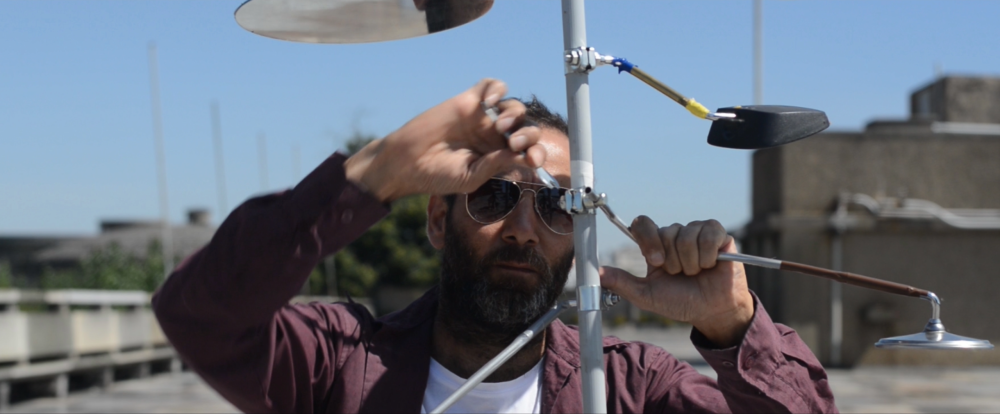
Amin Alsaden: It took the tragic war in Ukraine for the world to pay closer attention to the plight of refugees, a silent but immense catastrophe that has afflicted the modern world. Your work contemplates what millions have gone through, not only those from Iraq. But for the Kurdish people, who have been treated as a minority and experienced the wrath of nation-states that did not recognize their autonomy or sovereignty, leaving one’s homeland must be especially painful.
Hiwa K: All of us Kurdish people, in Turkey, Iran, Iraq, Syria, even in Georgia and other places, have always felt like guests in our own countries. They try to somehow alienate us from our land—from the soil itself, from trees, nature. And on top of that, we have to leave our countries because of conflicts created by the West, the outcome of the crises that capitalism is facing, which they try to solve at our expense. As Kurdish people, we are always forced to play the slave in this master-slave relationship. Everything is somehow infiltrating into this valley—I see Kurdistan as the void between these other countries, which are vertical forces. The nation-state for me is a vertical power, and the rest of us are more horizontal, organically related to each other. Being in a valley is also like being in the mother’s womb. But that gives us a certain form because we are forced to learn Turkish, to listen to Turkish songs, Farsi songs, Arabic songs. I am happy to be in this state, in the state of statelessness, without a nation-state.
When I come home, I sometimes ask myself, “What home?” I do not like the word “home.” When I come back to Iraq, to Kurdistan, and friends say, “Welcome home,” I say, “I did not come from another planet, I was on this planet.” I was already home. That is also the case in Europe, where I have spent exactly half of my life.
AA: I want to push on your idea of home. Do you see the entire planet as your home, that you are home wherever you go? Or is home for you just an invented construct that does not really exist?
HK: I always say wherever your feet are based, you are based. During the refugee crisis of 2015, someone with a big budget, millions of Euros, funded by some ministry in Germany, called me to say, “We want to work with you on the refugee issue.” I said, “Well, I am German, and I do not know why you are calling me.” When I use the word “pre-image” I am trying to pick up traces, the fingerprints we have on each other, which, instead of translating and transforming each other, have led to today’s catastrophes. When the Islamic world translated antiquities and reintroduced them to Europe as its forgotten past, it was a psychoanalytical treatment of Europe when it was in a state of amnesia, and it helped Europe boom, but then Europe used that knowledge to colonize others instead of translating it and passing the knowledge on. We are all living on this planet, and all of us are responsible for what is happening. It is very important in my practice to not accuse or blame anyone, but to think about what we can do together. Sometimes the slave has to teach the master how to reach a balance or how to rethink.
AA: Speaking of “pre-image,” you start your video Pre-image (Blind as the Mother Tongue) (2017) with a story, the advice your mother gave you before you embarked on your journey, telling you not to be scared of death. I thought that was potent and heartbreaking. Both of you knew the journey could be dangerous. Why did you decide to leave anyway?
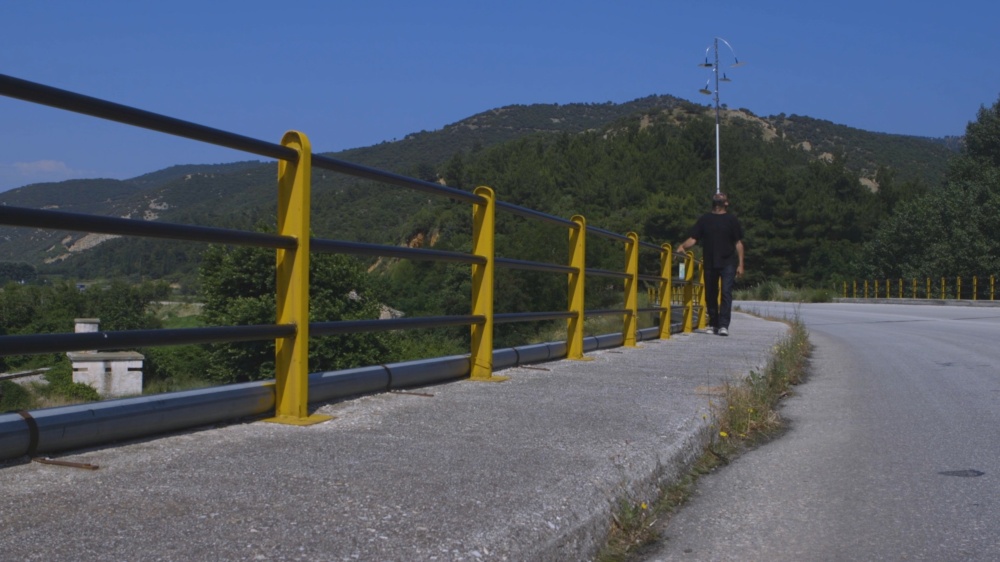
HK: There is a Kurdish saying, “If death comes, don’t panic, it’s just death,” but my mom said it in a different way, which is what you hear in the video. We all knew that they were shooting people at the borders; one week before we departed, they massacred twenty-eight young guys at the Turkish border. In the 1990s, the situation was so miserable and uncertain. Things were so bad that we used to tell each other, “We go, and if we survive, we survive; if we die, even better.” Back then, it was much more difficult to leave than now.
AA: My family also fled Iraq in the late 1990s, from Baghdad, but we managed to exit through the only legal crossing back then, at the border with Jordan, even though my parents were technically banned from traveling. In the video, you retrace your footsteps in the landscapes you navigated on your way to Germany. But I always wondered, why Germany? How did that become your destination? Although I understand that you spent a few years in the Netherlands first, learning flamenco music.
HK: Actually, in this work I am just quoting someone whose name is K. It is definitely about someone’s struggles, about how to survive, how to reach the place he wants to reach. I do not say this was my journey. It is important to keep it that way. For the same reasons, I would not answer “why Germany?” And the video did not end in Germany. On purpose, it ended at the Foro Italico in Rome. The end of a journey was a cemetery. All these beautiful statues built under Mussolini’s fascist regime in Italy. It is the cemetery of Europe itself, of its values. In the video, I ask why the statues are so still, why they do not run anymore. But maybe they run faster than their memories. Because fascists want you to forget, they overdose on beauty. Overdosing on beauty is also part of Western art. This is important to talk about because neofascism has been coming back for many years, even before Donald Trump was elected.
AA: That is indeed palpable in different parts of Europe, including the rhetoric in the most recent French elections. And Canadian conservatives are probably coming back too. Southern Europe, from Turkey to Rome, is the setting of this video, and we see you walking through breathtaking landscapes.
HK: Through Greece also, of course. I was in touch with a smuggler from the 1990s who drew a map for me of the paths people took on their journeys toward Europe. I do not want to say this was the journey that I took. This project took two years of filming.
AA: It is evident the project entailed a lot of work. As you walk through these landscapes, you also reflect on how the displaced feel that they are burdens, not on places but on their own feet, and how your feet became home during the journey. Your point of arrival was an encounter with fascism—was there ever a home for your feet where you felt safe and embraced? How about when you returned to Kurdistan?
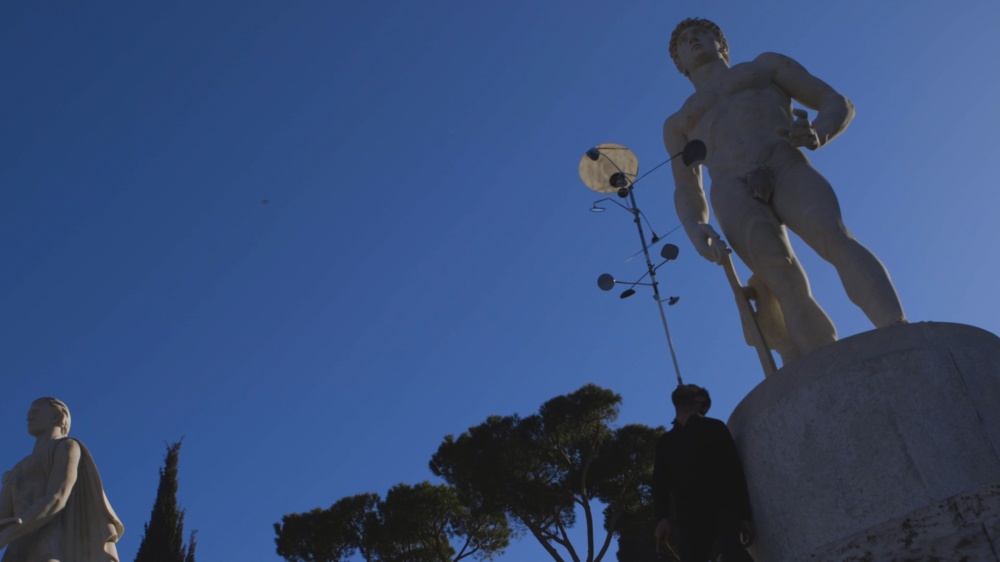
HK: No, never. And globally, if we think about it, everyone is in that state now. Because of the ecological crisis we are going to face—and we are only seeing its beginnings now—because of climate change, hundreds of millions of people will be displaced. In our region the temperature is slowly becoming unbearable. It is too hot in Kurdistan during the spring, and worse in summer. All these southern countries will not be livable anymore, so imagine all the people moving north. It is not surprising that the right wing is having a renaissance now in the West. People are voting for parties that will stop those refugee crises, which they are actually creating themselves. The West exports not only machines and pollution, but also wars. Turkey is moving slowly into Kurdistan, and Germany has been helping Turkey build two hundred dams, depriving Iraq and Syria of water. If you dig around, you will discover that everything is interconnected. This does not mean we cannot resist. The Prophet Mohammed said something like, “Start with your hands when you want to make a change. If you do not have the chance, use your tongue. And if you do not have the chance, do it in your heart, and that is the lowest level of faith.”
So, when you are displaced you will never find home. The force that pushed you away from home also cures you of the illusion of having one. When you understand that borders are invented, you have to focus on being where you are. Remember that Kurdistan is the only case where—because it has been divided into four parts—its borders go through its own center. When we rethink the idea of home, that will heal the difference between us, what separates us from each other.
AA: It is important to remember that politics divide us, while cultures are mixed and fluid. There is also our relationship with the land we traverse, despite borders and other politicized barriers. In the same video, atmospheric sounds seem to be crucial. I would even say that the sounds of the landscapes are protagonists in this work. You seem to be emphasizing the picturesque European scenes you navigate, which contrast sharply with the stories and reflections you share. Those landscapes must have been quite hostile for you when you tried to pass through them unnoticed. How did you feel when you revisited the same places to produce this work?
HK: It was very difficult. For the first two days, I could not balance the object with the motorcycle mirrors, which you see in the videos, on my nose—something I can always do. I was too emotional, and I had to tell the cameraperson, a great and professional guy, that we should keep the shoot casual and intimate, not too polished. The process also started with pain: we began with the scene where I was coming out of the water, and I stepped on a creature with thorns, so I was also falling down.
The question of image versus sound goes back to my education, and my environment taught me there is always a connection. In the video, I mention the relationship between Narcissus and Echo. As I interpret what Jacques Derrida said about the myth, Narcissus is constantly trying to project the word Narcissus toward Echo, and Echo’s job is to reflect the word Narcissus toward Narcissus. But Echo is smart, and she knows it is a reflection of sound and not an image, so she tries to translate this word and reflect Echo instead of Narcissus. That is the moment you stop being a victim. You are not trying to accuse anyone. You are making something constructive out of a situation that is trying to turn you into an image.
I often say if other countries are about belonging, Kurdishness is about longing. Somehow, you are an interval, not a tone. In music, the difference between two tones is determined by the size of the interval. Countries around you are determined, but you do not reflect an official entity. You are somehow creating the space, the emptiness that gives the form. Sound for me was very important, and not only the voice, but also the sound of every environment. Sound is important when we think of the pre-image, and of questioning what we make out of others. We make an image in order to conquer it, to control it, and sound can complicate that. But when you are panicking, when you are displaced and balancing something carefully, you do not have the luxury of making an image, because you see everything in a completely pragmatic way. This is also about questioning the image that the West makes of other countries. You make an image because you have the luxury of sitting on a comfortable couch and gazing at something. But on the other side, there is no gazing, only the translation of a vertical image into the horizontality of sound.
AA: What you say about the Kurds is compelling, but what is it that they are longing for?
HK: You might be longing for an image, a motivation that takes you toward something, but not in a fascist or nationalistic way. We have this feeling of longing for each other, and we might understand each other, but we do not all sound the same. Unlike other languages, Kurdish depends on location, so you have Sorani, Kurmanji, Zazaki. Even within Iraq there are several dialects—Hawrami, Badini, and others—and you might not get what someone from another city says. We speak Kurdish but we also speak foreign languages in our mother tongues. And even if we do not understand each other, we still feel that it is Kurdish, which somehow connects us, although there are other things that drive us apart. Kurdishness is about not having a country. It is both the form and formlessness that other nations could learn from.
AA: I want to bring your reflections on art to bear on these questions. I found it funny—and some of your musings are quite humorous—when you say in the video that the only burden you carried with you in that journey was that of Western art history. What do you mean by that? Do you see your work to be outside the tradition of Western art?
HK: That was literally the only burden. I had one backpack and no food or money, but I did have some artworks. During breaks in Turkey when I was not working, I was making those paintings. Until 1998, I was more oriented toward Western art. I was somehow brainwashed, or I had submitted to these criteria about what art is, which were determined by the West. It was a burden. I was stuck in someone else’s dream. I was an abstract painter for fourteen years, and I was well known in my country as a painter, a professional in Western abstract painting. Then I stopped painting. I took a seven-year break from visual arts, and studied music. But like people who take a journey on their knees to visit a saint, I was balancing this device on my nose in the video, and carrying a backpack in the 1990s with abstract paintings—these are burdens that are sometimes necessary to clear the record. I discovered that the burden was the West itself. The West that caused my displacement, twice, also determined my regime of aesthetics.
AA: Speaking of the burdens of the West, I am curious to know why you chose English, not Kurdish or German, as the language in these works—although you do use Kurdish, but for a very specific purpose. I also understand that you speak six languages, including Arabic, which you had to learn in school. So why English, and do you see language as another form of alienation, another burden?
HK: If you want to go beyond the English language you must speak it. We have to confess that we all are thinking in English. We now have a generation in Iraq, in Kurdistan, who do not speak good Kurdish, but they speak perfect American, like my nephew. This process of Americanization is horrible, and it is spreading everywhere. Even the streets are being named after Chicago or Manhattan. When I started to write for these videos, I wrote immediately in English. I would not say my English is good, but it is my English, which I learned organically on the streets.
There is only one part toward the end of the video when I speak in Kurdish, where you get into darkness. After a year and a half of filming, the cameraperson and I wanted to get on a ship near Patras, but they did not allow us to film there. So we took a twenty-four-hour trip for nothing. But that gave me the idea of making the screen completely dark. Because when you go under a truck to hide, it is completely dark and you do not know how long it might take to get somewhere. You also do not know where it will go. That gave me the idea of switching to my mother tongue. Because you become blind in the darkness, and when you become blind you speak your mother tongue.
AA: That explains the title of that video. I recall this beautiful essay by Edward Said on exile, where he says there is an inherent sadness to that condition, which one can never overcome. But again, many of your reflections are humorous—that sarcastic and pained humor that some of us employ to cope. Do audiences tend to take your work too seriously, or do they appreciate the lighter side?
HK: Yes, they take it so seriously that they can laugh about it. The humor comes to me naturally. In Iraqi Kurdistan—specifically Sulaymaniyah, where I come from—we are well-known for our jokes. Even kids somehow reverse what you say into something else. So you always have to be careful about what you say to people, because they can make fun of you, and everyone laughs, and you laugh along with them. There is a lot of humor around Sulaymaniyah, and Sulaymaniyah is also the city where demonstrations and protests usually start, and there is a lot of irony in these events. I explored that in My Father’s Color Period (2012), about a silent protest that people held against the government for refusing to bring color TVs to Kurdistan. There is a lot of death in Kurdistan too.
About 5,000 villages around Kurdistan, during the time of Saddam Hussein, were burned down, and 182,000 people from those villages were buried. In Halabja, when they started to use chemical weapons, people started to joke about the bad smell—a very sarcastic joke of course. I am from Halabja originally. That was their way of dealing with the situation. But not as victims. In the end, you just have to laugh. Especially now, as we are going to the edge of extinction as a species, and taking other species with us. You laugh at all the wrong things we have done, at how seriously we took things, at all the dramas we created.
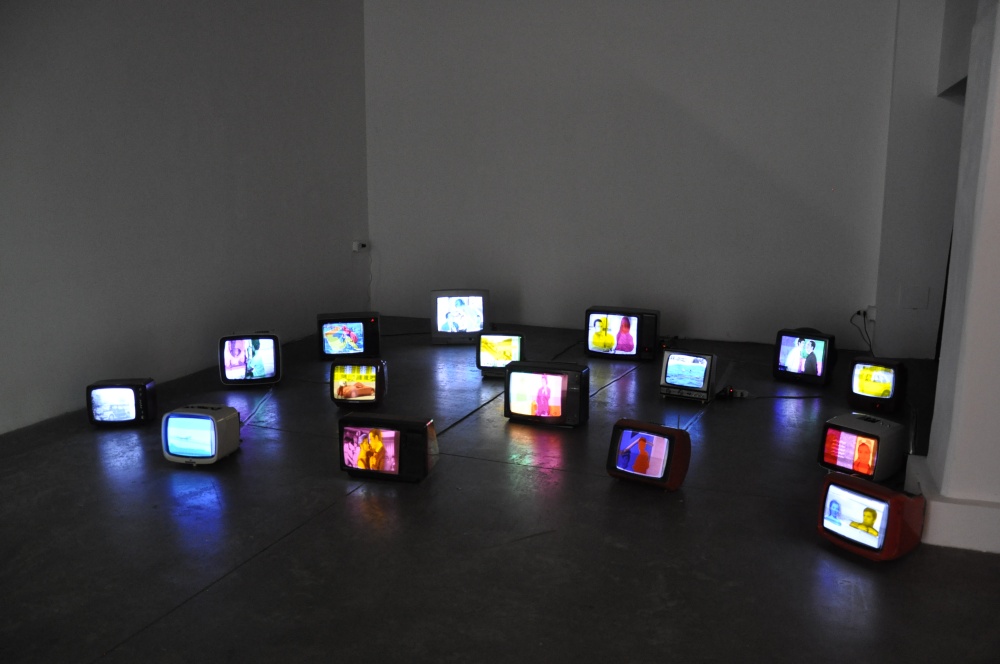
AA: The humor makes your work relatable, yet I wonder if the work has been fetishized by Western institutions, especially in recent years, with all the migrants drowning in the Mediterranean, or the million refugees Germany took in. Has your work been mobilized to achieve certain political goals that you are not happy with?
HK: As soon as I smelled this, I stepped out of the art market, because there is a tendency to make stars out of artists. There is a big market for the refugee issue. And there are lots of people who would love to be stars and ambassadors for refugees, or ambassadors for all kinds of things. I realized that whenever they talked about my work, like my project in Documenta, they were seeing it only as a refugee work. But I am talking about layers of history, and how we are all embedded in each other. People try to reduce your practice to only one thing, but you do not want to reduce a subject like this.
So, I started to come back to Kurdistan and I bought a small piece of land. I am working with the soil, with trees, with worms. And working with farmers here, trying to show films, translate films, and discuss politics, especially the changes that have been taking place since 2003, how they are dividing the country and alienating the people. In my current practice, there is more heart than art. They always try to make you vertical, and you have to keep the horizontality of your work. They always try to fetishize you. Artists need to know when it is the right moment to make a U-turn.
AA: Your work resonates because it is so humble, because of this horizontality. In addition to the humor, there is also the poetry—or, let’s say, the poetic prose—that you excel at, and which you use to express dark, complex, and personal subjects, such as your experiences of war, migration, and estrangement. I am wondering about the script in a time-based medium like video, which I believe is particularly conducive to telling stories that involve movement.
HK: This was the first time that I used my voice or used voiceover. I did it first with Pre-Image (Porto) (2014) and then with Pre-Image (Blind as the Mother Tongue). It was my first time writing too. And even in English, it was my first time, and I actually removed 80 percent of the text, because the video would have been an hour long. I have been writing my autobiography for a few years now, and the text is more expansive there. But for this work, I had to keep it simple and short. I do not want to torture people by making them sit for a long time, and people do not have that much patience anyway.
I also realized that I am quite free with video, as I am with music, with cooking, with dancing. You normally have an artist at the center and the medium on the periphery. But I am at the periphery, and it is the medium that tells me that I have to learn dancing, I have to learn balancing on my nose, I need to go and learn this thing, this technique. So, I adapt myself to the medium. Writing was also one of these things I had to learn. In the video I say that after surviving three abortion attempts, I started an affair with reality, and when you are in an affair you are not allowed to enter through the main door, so you have to find your way from the backyard, adapting your body to the form of small windows. This wakes up the poet in you.
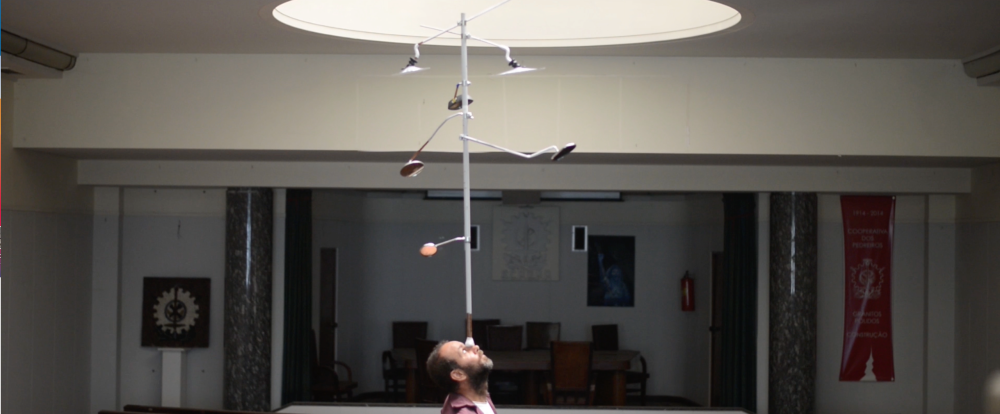
AA: I wish there was a trilogy of these videos, because I feel you have a lot more to say about the subject. Poetry brings me back to the question of language, and home, which seems critical here. I would imagine for you as a Kurdish person, language may designate your sense of belonging to the homeland.
HK: That is a difficult question because I would say my language is me. I am my language. But it does not mean that I should be oriented toward a nation-state. Turkish politics tried to make me forget my language, to make me forget myself. You hear your mother tongue when you are in the womb, through the backbone of your mother. And that is because the first thing you are in touch with is hearing. The mother tongue is something that grows up with your flesh, with your bones. And so, this is me. I could not say “I love you” to a Turkish person in Turkish in the same way I would say it in Kurdish.
But language does not have to be antagonistic, separating me from someone else. It can designate your relationship with a place, but it should not be the identity of the similarity. It should not be a portrait that looks like me, as an image. The Kurdish language has all these dialects and all these influences, which always keep it vital, always developing new terminologies and new ways of survival. But I would not see it as my identity or as an image.
AA: When we hear you speaking only Kurdish in Pre-Image (Blind as the Mother Tongue) and the screen goes black, there is a powerful line: you express trepidation about stepping into fear, how that could make you inhabit fear. But is this the fear that the journey might fail, that you might be discovered and sent back? Is it the fear of being lost? Is it the fear of never finding home when you just left yours?
HK: We always justify our fears, but fear is itself fear. We come into this world with the trauma of being separated from the Goddess, and we always feel guilty about that. I think all our miseries come from that fear. We are weak, so we start to create an ego that goes through three institutions: family, education, and the institution of prison itself, waiting for you. If you do not comply with these institutions, you are not a good person. So, this fear is part of the state of being human. In the part of the story of Gilgamesh when Enkidu sleeps with Shamhat and he learns to become human, that scares the animals that used to trust him—that is the very moment when he leaves nature and enters culture. So, fear has lots of layers. We are afraid of things as human beings, and we just have to step into it and say that we always have fear.
Maybe that is also why I left Europe, because I feared playing a part in fetishizing my work, and because there is so much to be cured back in Kurdistan. I wanted to be like a nurse because there are many issues and struggles to address. This brought me back to a spiritual and conscious practice, to work together and build community, to deal with what has been done to people here, to our soil, since the American-led invasion.
One of my dreams is to build a house and residency on my land, but we need funding, maybe some grants to make that happen. I would love to bring people together from different backgrounds, not only art, but also activism, poetry, permaculture, and other fields.
AA: I would like to participate in such a residency myself. You speak so eloquently about returning to soil, caring for land. I have been thinking about this question a lot lately, partly because I am currently living on Indigenous land in Canada and wondering about my responsibilities toward this territory and its original inhabitants. What is a displaced person’s relationship with a land, not just the one left behind, but also the terrains you pass through, and the land you end up inhabiting when you settle down?
HK: It is a disturbed relationship. Because of capitalism, and even before that, we have always been exploiting the land. We see it only from the perspective of the profit we can make from it, without thinking of giving something back to it. But whether you are in Berlin, Kurdistan, or anywhere else, as long as your feet are there, you are part of that land. You can start your practice there, you can connect with the land and establish a community with people there, grow things together, try to consume less, and so on. We do not have to be attached to the land because that is what the ego wants, to own the land.
Wherever you are, stick to the land, but do not get stuck in it.
Hiwa K has participated in group exhibitions at various international venues, including documenta 14 (Kassel/Athens, 2017), the 2015 Venice Biennale, Serpentine Gallery, London (2012), and Manifesta 7 (Trentino, 2008). He has had solo shows at The Power Plant, Toronto (2022), Jameel Arts Center, Dubai (2020), New Museum, New York (2018), and Kunstverein Hannover (2018). In 2016 he received the Arnold Bode Prize and the Schering Stiftung Art Award.
Amin Alsaden is a curator, educator, and scholar of art and architecture whose work focuses on transnational solidarities and exchanges across cultural boundaries. With a commitment to advancing social justice, Alsaden’s research and curatorial practice contribute to the dissemination of more inclusive and global narratives. He is particularly interested in how artists respond to the experiences of displacement and belonging.

